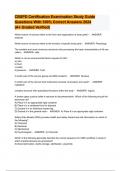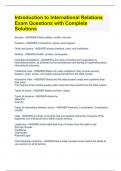Introduction to Law
Aims of Law:
Law does not only threaten those who do what it forbids, but promises to protect people’s interests.
- Setting up an official framework of compulsion: forbidding certain ways of behaving and
requiring others. There are sanctions for not doing this.
- To provide facilities for people to make their own arrangements (employment, etc.)
- To settle disputes about what the law is and whether it has been broken
- Settle what the system of government is to be.
Three visions on law:
School of legal positivism (Positive law)
- Law is the collection of rules legally formulated by empowered institutions
- This is certain and democratic
- Dura lex sed lex: Law is hard, but it is the law; morally inacceptable law should be changed
according to the right procedures.
School of natural law (Moral principles/ideal law)
- Law should be based on morality and ethics
- Positive law is partly natural law
- Sources: written law, unwritten principles
- Natural law is “discovered” by humans through the use of reason and choosing between
good and evil.
- Broadly shared => Democratic
- Often causes uncertainty by conflicting principles and vague meaning
Pragmatic school (Interactionism/pragmatism)
- Law in action: what do people consider legitimate to do?
- Law based on judicial decision-making
- Contextual: what is the context of people’s violation of law?
- Flexible and bottom-up
Characteristics of law (and how to distinguish with morality)
- Degrees vs. Binary. One of Law’s main functions is to guide behaviour by prohibiting and
prescribing acts. Most of morality is not concerned with guidelines for behaviour: it does not
directly tell us what we should do or should not do, it comes in degrees (exceptions).
o Society is not only governed by legal rules, also other types (religion, etc.)
- Collective enforcement. A characteristic that distinguishes legal rules from other rules is that
the former are normally enforced by collective means and in particular by organ of the state.
Legal sanctions are also very specific (fines, jail).
- Moral Standards. Moral norms and standards are normally considered to be important for
the well-functioning of society, while this is not necessarily for all legal rules.
- Positive law. Most legal rules are created by state agencies.
Legal certainty:
- Certainty about the content of law
, - Certainty about that law will be enforced
- Certainty that the law will be applied consistently
Moral rules and standards do not always fully agree with positive mortality (if drugs are prohibited,
why not alcohol?)
Customary law -> Consists of guidelines for behaviour that have grown spontaneously in a society in
the form of mutual expectations, which after some time are accepted as binding (and used in legal
decision making).
Civil law:
- Written constitution
- Codification
- Parliament is king
- Basic rationality:
o Starting from abstract concepts
o Logical application of facts
o Clear differentiation between facts and law
- Inquisitorial criminal law procedure
- If … Then …
The Literal Rule/Grammatical Interpretation: Rules should be interpreted literally (so if somewhere
there are no dogs allowed by law, then neither are guide dogs)
The Mischief Rule/Legislative Intent: If a legal decision maker gives the rule an interpretation that
makes it suit the intention of the legislator
The Golden Rule: Purposive or Teleological Interpretation: When an interpreter tries to determine
the purpose of the rule himself. (So she might decide to let guide dogs in, because she finds this
more important than hygiene)
All these choices are called The Lawyer’s Toolbox.
Common law:
- Not always a written constitution
- The judge is king: judge has more flexibility to find solution
- Binding precedents (earlier events or actions that is regarded as an example)
- Reasoning from other cases -> Analogous reasoning
- Extensive freedom of contract
- Adversarial criminal law procedure (+jury)
Constitutional Law
Constitutional Law -> The branch of law that regulates the state itself.
- Protects the legal position of the individual against the state
- How the law is organized, the power of organs and the relations between them
- Constitution: The most important constitutional rules have been laid down here
- Case Law can be important where courts lay down rules with a constitutional focus
- Customary Law often plays a role in the internal proceedings of parliaments
, - Entrenchment: Constitutional law can only be amended through difficult, special procedures
often involving special majorities
o Meant to make changes harder than in ordinary law, protects minorities.
State Power Established:
State -> An organization that is able to control a certain territory and the people living in it, both in
the sense of defending it against the outside of the world and in the sense of exercising powers and
maintaining law and order inside its own borders.
Sovereignty
Internal/Legislative sovereignty:
o Sovereignty in that sense is the quality/state of having supreme power or authority
The right of the legislature of a state to make any law it pleases
o In modern times, the idea has gained ground that the ultimate source of authority
within a state lies with the people.
o A major problem in connection with statehood is how to cope with secession (parts
of a state want to become independent)
State needs to prevent revolutionary movement
This demand is not met if secession is ongoing
It depends on externals how they will deal with the recognition of the new
state entity
o Failed states: some states simply do not manage to exercise effective internal control
and the monopoly of force, so they do not meet the criteria of statehood
External Sovereignty:
o A state is independent of other states and other states are not authorized to meddle
into internal affairs of a sovereign state
o Degrees of Statehood: Statehood is not an all-or-nothing matter.
o A possible criterion for statehood is whether a potential state is recognized by the
“international community” of states. This would mean that most or all others states
engage in diplomatic relations and that the potential state is accepted as a member
of an international organization (as UN). This is not always the case, though.
Nation state -> A state where a group lives that has the feeling of a shared past and identity.
Globalization -> Technological progress in the area of transportation and communication has made it
more and more irrelevant where goods and services are produced
As people and economies become interconnected as a result, decision taken in one state
may have impact on the people in another state (this means not everything is determined
internally anymore -> loss of sovereignty) Yet, these people are not represented in the state
where the decision is made.
Think of food production (standards), crisis, environment, human rights,
Human Rights are of universal value irrespective of the preferences of individual states
Voluntarism: The most important way to secure the sovereign not being bound to any higher
authority is to insist on the principle of unanimity in international relations. Unanimity
means that a decision can only be taken with the approval of every participant.
Treaties can help with that (is stronger than a constitution)
Yet, unanimity only governs the conclusion not the application. (choice by majority)
Power Differences (weak/poor vs. rich/powerful because economic size and military power)
, State Power Constrained
Absolutism -> The principle or the exercise of complete and unrestricted power in government/ruler,
that don’t have to live up to the law.
Limitations on State Power:
There are practical limits (it is hard to spy on people in their home, for example)
Also the morality and self-interest of the government itself can play a role (not enough but
important because the rulers have to accept they have to listen to the law)
Treaties (yet states in the EU are still sovereign, because they can leave (with consequences)
Constitutional law also limits the power of the state:
Territorial Division (Federalism): Its power may be distributed between different territorial
subunits
o Because the country is too large, there are different languages/cultures or a central
government can be too powerful
o Can even have all three parts of law -> expensive, but can hold a country together
o Unitary State: All state powers ultimately reside in one central government authority
(there may be local authorities, but those powers are granted by central laws)
Their power is laid down in national laws
Different degrees of centralization of power
o Federations: The state powers are divided between the organs of the central state
(federal level) and the organs of the subunits (regional level)
Their power is laid down in the constitution itself and they are involved in
any change in the constitution and participate in federal law making.
o Confederations: The participating entities effectively remain sovereign states in their
own right. The decision-making is restricted to limited issues and requires unanimity
May actually be so loose that it would not actually be called a state
US before 1791
Functional division:
o Montesquieu distinguished three function of the state:
1. The creation of general legal rules by means of legislation
2. The practical implementation and execution of these rules: administration
3. The application of rules to decide disagreement in individual cases: adjudication
a. These three functions ought to be kept apart (assigned to three separate
branches) -> The legislature/often Parliament (1), executive (2),
judiciary/court (3)
b. Has become known as the Trias Politica
Independent Courts:
o Elected Judges by popular vote, answerable to community and not depending on the
government
Democratic, yet sometimes government is anxious (too much prisoners?)
o Appointed Judges
Independence can still be ensured by being appointed for life or for a limited
but long period without possibility for a second term. (No pressure of
government)
o Court and judges must be impartial in two senses: 1. They should not have interests
in the outcome of a case through involvement/relations (objective impartiality). 2.
Aims of Law:
Law does not only threaten those who do what it forbids, but promises to protect people’s interests.
- Setting up an official framework of compulsion: forbidding certain ways of behaving and
requiring others. There are sanctions for not doing this.
- To provide facilities for people to make their own arrangements (employment, etc.)
- To settle disputes about what the law is and whether it has been broken
- Settle what the system of government is to be.
Three visions on law:
School of legal positivism (Positive law)
- Law is the collection of rules legally formulated by empowered institutions
- This is certain and democratic
- Dura lex sed lex: Law is hard, but it is the law; morally inacceptable law should be changed
according to the right procedures.
School of natural law (Moral principles/ideal law)
- Law should be based on morality and ethics
- Positive law is partly natural law
- Sources: written law, unwritten principles
- Natural law is “discovered” by humans through the use of reason and choosing between
good and evil.
- Broadly shared => Democratic
- Often causes uncertainty by conflicting principles and vague meaning
Pragmatic school (Interactionism/pragmatism)
- Law in action: what do people consider legitimate to do?
- Law based on judicial decision-making
- Contextual: what is the context of people’s violation of law?
- Flexible and bottom-up
Characteristics of law (and how to distinguish with morality)
- Degrees vs. Binary. One of Law’s main functions is to guide behaviour by prohibiting and
prescribing acts. Most of morality is not concerned with guidelines for behaviour: it does not
directly tell us what we should do or should not do, it comes in degrees (exceptions).
o Society is not only governed by legal rules, also other types (religion, etc.)
- Collective enforcement. A characteristic that distinguishes legal rules from other rules is that
the former are normally enforced by collective means and in particular by organ of the state.
Legal sanctions are also very specific (fines, jail).
- Moral Standards. Moral norms and standards are normally considered to be important for
the well-functioning of society, while this is not necessarily for all legal rules.
- Positive law. Most legal rules are created by state agencies.
Legal certainty:
- Certainty about the content of law
, - Certainty about that law will be enforced
- Certainty that the law will be applied consistently
Moral rules and standards do not always fully agree with positive mortality (if drugs are prohibited,
why not alcohol?)
Customary law -> Consists of guidelines for behaviour that have grown spontaneously in a society in
the form of mutual expectations, which after some time are accepted as binding (and used in legal
decision making).
Civil law:
- Written constitution
- Codification
- Parliament is king
- Basic rationality:
o Starting from abstract concepts
o Logical application of facts
o Clear differentiation between facts and law
- Inquisitorial criminal law procedure
- If … Then …
The Literal Rule/Grammatical Interpretation: Rules should be interpreted literally (so if somewhere
there are no dogs allowed by law, then neither are guide dogs)
The Mischief Rule/Legislative Intent: If a legal decision maker gives the rule an interpretation that
makes it suit the intention of the legislator
The Golden Rule: Purposive or Teleological Interpretation: When an interpreter tries to determine
the purpose of the rule himself. (So she might decide to let guide dogs in, because she finds this
more important than hygiene)
All these choices are called The Lawyer’s Toolbox.
Common law:
- Not always a written constitution
- The judge is king: judge has more flexibility to find solution
- Binding precedents (earlier events or actions that is regarded as an example)
- Reasoning from other cases -> Analogous reasoning
- Extensive freedom of contract
- Adversarial criminal law procedure (+jury)
Constitutional Law
Constitutional Law -> The branch of law that regulates the state itself.
- Protects the legal position of the individual against the state
- How the law is organized, the power of organs and the relations between them
- Constitution: The most important constitutional rules have been laid down here
- Case Law can be important where courts lay down rules with a constitutional focus
- Customary Law often plays a role in the internal proceedings of parliaments
, - Entrenchment: Constitutional law can only be amended through difficult, special procedures
often involving special majorities
o Meant to make changes harder than in ordinary law, protects minorities.
State Power Established:
State -> An organization that is able to control a certain territory and the people living in it, both in
the sense of defending it against the outside of the world and in the sense of exercising powers and
maintaining law and order inside its own borders.
Sovereignty
Internal/Legislative sovereignty:
o Sovereignty in that sense is the quality/state of having supreme power or authority
The right of the legislature of a state to make any law it pleases
o In modern times, the idea has gained ground that the ultimate source of authority
within a state lies with the people.
o A major problem in connection with statehood is how to cope with secession (parts
of a state want to become independent)
State needs to prevent revolutionary movement
This demand is not met if secession is ongoing
It depends on externals how they will deal with the recognition of the new
state entity
o Failed states: some states simply do not manage to exercise effective internal control
and the monopoly of force, so they do not meet the criteria of statehood
External Sovereignty:
o A state is independent of other states and other states are not authorized to meddle
into internal affairs of a sovereign state
o Degrees of Statehood: Statehood is not an all-or-nothing matter.
o A possible criterion for statehood is whether a potential state is recognized by the
“international community” of states. This would mean that most or all others states
engage in diplomatic relations and that the potential state is accepted as a member
of an international organization (as UN). This is not always the case, though.
Nation state -> A state where a group lives that has the feeling of a shared past and identity.
Globalization -> Technological progress in the area of transportation and communication has made it
more and more irrelevant where goods and services are produced
As people and economies become interconnected as a result, decision taken in one state
may have impact on the people in another state (this means not everything is determined
internally anymore -> loss of sovereignty) Yet, these people are not represented in the state
where the decision is made.
Think of food production (standards), crisis, environment, human rights,
Human Rights are of universal value irrespective of the preferences of individual states
Voluntarism: The most important way to secure the sovereign not being bound to any higher
authority is to insist on the principle of unanimity in international relations. Unanimity
means that a decision can only be taken with the approval of every participant.
Treaties can help with that (is stronger than a constitution)
Yet, unanimity only governs the conclusion not the application. (choice by majority)
Power Differences (weak/poor vs. rich/powerful because economic size and military power)
, State Power Constrained
Absolutism -> The principle or the exercise of complete and unrestricted power in government/ruler,
that don’t have to live up to the law.
Limitations on State Power:
There are practical limits (it is hard to spy on people in their home, for example)
Also the morality and self-interest of the government itself can play a role (not enough but
important because the rulers have to accept they have to listen to the law)
Treaties (yet states in the EU are still sovereign, because they can leave (with consequences)
Constitutional law also limits the power of the state:
Territorial Division (Federalism): Its power may be distributed between different territorial
subunits
o Because the country is too large, there are different languages/cultures or a central
government can be too powerful
o Can even have all three parts of law -> expensive, but can hold a country together
o Unitary State: All state powers ultimately reside in one central government authority
(there may be local authorities, but those powers are granted by central laws)
Their power is laid down in national laws
Different degrees of centralization of power
o Federations: The state powers are divided between the organs of the central state
(federal level) and the organs of the subunits (regional level)
Their power is laid down in the constitution itself and they are involved in
any change in the constitution and participate in federal law making.
o Confederations: The participating entities effectively remain sovereign states in their
own right. The decision-making is restricted to limited issues and requires unanimity
May actually be so loose that it would not actually be called a state
US before 1791
Functional division:
o Montesquieu distinguished three function of the state:
1. The creation of general legal rules by means of legislation
2. The practical implementation and execution of these rules: administration
3. The application of rules to decide disagreement in individual cases: adjudication
a. These three functions ought to be kept apart (assigned to three separate
branches) -> The legislature/often Parliament (1), executive (2),
judiciary/court (3)
b. Has become known as the Trias Politica
Independent Courts:
o Elected Judges by popular vote, answerable to community and not depending on the
government
Democratic, yet sometimes government is anxious (too much prisoners?)
o Appointed Judges
Independence can still be ensured by being appointed for life or for a limited
but long period without possibility for a second term. (No pressure of
government)
o Court and judges must be impartial in two senses: 1. They should not have interests
in the outcome of a case through involvement/relations (objective impartiality). 2.







